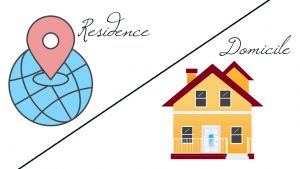Differences Between Residence And Domicile: In English language, there are certain words which are synonymous with each other. They are used interchangeably when referring to same thing. In some cases, the words acquire same meaning in a context, and in other cases, they may slightly differ in meaning. Such words may pose difficulty in ascertaining their meanings when used in the wrong context.
However, to place a distinction to the meaning attributable to certain words, their is usually a legal definition of those words. This is to the effect that the words, though, may have similar meaning, can be distinguished from each other when they are used in a document. Words when used in a legal sense often times acquire different meaning from the one which they are spoken everyday.
An example of this are words like residence and domicile. Both words relate to dwelling. They could be used interchangeably in normal day speech. However the big question begging for answer is, do they mean the same thing in the legal sense? If one is to fill a document in which one is asked of his residence and domicile, do they want him to fill in same information? Or he is expected to put in different information with regard to the question asked.
To this end, the differences between residence and domicile will be discussed. This is because there are key features which distinguishes the former from the later. However, for these distinctions to be part understood, the concepts of residence and domicile will first be explained.

Recommended: Differences between formal and informal letter
Meaning of Residence
Residence as defined by the Merriam-Webster dictionary “the act or fact of dwelling in a place for some time; the act or fact of living or regularly staying at or in some place for the discharge of a duty or the enjoyment of a benefit“. It is the place where a person lives temporarily. In residency, there is no intention of the person to make the place where he dwells a permanent abode. He is most likely to leave the place at the end of his transaction there.
Also see: How to sue someone in a different country
Meaning of Domicile
Domicile is used in determining jurisdiction. It is the place where a person resides with the intention of making it his permanent place of residence. Domicile is larger in scope, meaning and has more obligations than residence. According to the Big Law Dictionary Mobile App, domicile is the status or attribution of being a lawful permanent resident in a particular jurisdiction. A person can still be domiciled in a place even when he has left the place provided he has established sufficient link with the jurisdiction.
Recommended: Advantages and Disadvantages of a rigid constitution
There are three types of domicile which are domicile of origin, domicile of choice and domicile of dependency. Domicile of origin is that domicile which a person acquires at birth. Domicile of origin can be acquired via any of these ways:
1. Where the father of the child was alive at the time of birth, the child’s domicile is that of the father.
2. Where the father of the child was not alive at the time of birth; or where the child was delivered out of wedlock, the mother’s domicile becomes the domicile of the child; and
3. Where the parents are not known, the domicile of the child is the place where the child was found.

Domicile of Choice is that which is acquired by the wilfull act of a man in which he fixes his place of residence with the intention of permanently residing there. It can be acquired when a child who has reached majority age subsequently settles in another jurisdiction with the intention of making that place his permanent home.
It should however be noted that where a person who acquires a domicile by choice moves away from that domicile with the intention of permanently settling in another place but is not yet domiciled in another jurisdiction, his place of domicile reverts back to his domicile of origin until he settles in a new place permanently.
Domicile of dependency is that domicile which is acquired by virtue of the fact that a person is dependent on another. Where a person depends on another for by reason of infancy, or any other valid reasons, the domicile of whoever is his guardian becomes his domicile. For example, the domicile of a child would change if the parent of that child or his guardian ad litem changes domicile. Also, the domicile of a woman will change to that of her husband when she gets married.
Finally, where a person was born mentally incapacitated or he becomes mentally incapacitated while he is still a minor, his domicile remains that of his guardian or parents as he will still be treated as a dependent child pending the time his incapacity will be over. His domicile will thus be the domicile of his parents or guardian.
Recommended: Differences between growth and development
Distinctions between residence and domicile

Residence refers to a place where a person lives temporarily. Residence is just a temporary abode of a person where he stays for some purposes or the other but he is not intending to make it his permanent dwelling place. Residence is the physical location of a person. A place where he stays temporarily. On the other hand, domicile is a place where someone stays with the intention of making it his permanent place of abode. The major distinction here is the intention to make the place permanent. That is, a person domiciled in a country is permanently living in that country. The intention to make that residence of his permanent is the main distinguishing feature between residence and domicile.
Another distinction between residence and domicile is that residence is a part of domicile. Residence is just the physical living place of a person within a country and nothing more. On the other hand, domicile is residence plus the intention of making the place of residence a permanent abode.
Again, a person might have more than one residences. He might be residing in two or more places at a given time. He may reside in different countries for different reasons or purposes. However, a person can only have one domicile. He cannot be domiciled in two or more places at a given time. He cannot be domiciled in two places at a time even if he has residence in two or more places.
For example, one may have residence in the United Kingdom for purpose of his business transactions, have another in Germany whenever he goes on vacation to Germany, yet he is domiciled in France, which is his permanent address and with which, he can be reached. Thus, there is only one domicile though, one may have many residences.
Recommended: Major tools for economic analysis
In conclusion, while both residence and domicile may seem to mean same thing from the normal usage of the words, they are actually different and have different implications in law. Domicile is majorly used to determine jurisdiction and the imposition of obligations like payment of taxes and fees. Usually, in a statute, words acquire the meanings that have been ascribed to them by the legal draftsman. This is why residence and domicile, though, may have similar meaning or used interchangeably in everyday speech, the legal implications are different as they have clearly defined meanings in law.

Edeh Samuel Chukwuemeka, ACMC, is a lawyer and a certified mediator/conciliator in Nigeria. He is also a developer with knowledge in various programming languages. Samuel is determined to leverage his skills in technology, SEO, and legal practice to revolutionize the legal profession worldwide by creating web and mobile applications that simplify legal research. Sam is also passionate about educating and providing valuable information to people.
